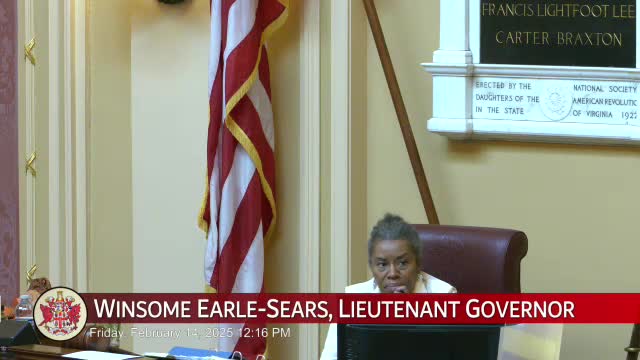Senate narrows access to video testimony for child witnesses, adopts moderate-trauma standard
Get AI-powered insights, summaries, and transcripts
Subscribe
Summary
After multi-year committee work, the Virginia Senate passed House Bill 17 28 with amendments that require a higher showing ("moderate trauma") supported by expert testimony and a 14-day pre-trial motion before a judge may allow a child to testify by secure video to protect confrontation rights.
The Virginia Senate on Feb. 14 passed House Bill 17 28, a measure that updates when a child victim or witness may testify by secure two-way video instead of appearing live in court.
Senator Sarravel, who carried the motion on the floor, said the measure reflects years of work to balance victims' trauma and defendants' constitutional confrontation rights. She described the committee amendments adopted on the floor as narrowing the standard from the House version and adding procedural safeguards.
The committee and floor amendments require three principal elements for a judge to allow video testimony without live confrontation: an evidentiary showing of "moderate trauma" (a higher threshold than mere stress), expert testimony establishing that condition, and a requirement that the motion be filed at least 14 days before the trial date. The sponsor noted the amendments also limit the proposed relief to circumstances where a child's ability to communicate in court would be impaired.
Senator Sarravel said the existing law sets a higher bar to protect a defendant's Sixth Amendment confrontation rights and that the amendment group reflects a compromise between advocates for victims and concerns about constitutional protections. She noted she had voted against an earlier, broader House version in committee because that draft used a lower trauma threshold.
Floor debate acknowledged the law's complexity and the need for clarity. Supporters said the measure will allow courts to reduce emotional harm to child witnesses while maintaining standards used by judges to protect confrontation rights. Opponents cautioned that lowering the bar too far risks interfering with defendants' rights.
The Senate recorded the roll-call vote as "Eyes 32, nose 4." The clerk announced the bill passes.
Why it matters: The bill changes the evidentiary threshold and process for courts considering remote testimony by child victims, affecting how trials in child-victim cases will be conducted across Virginia. Courts and defense and prosecution offices will need to integrate the expert-evidence and timing requirements into pretrial practice.
What to watch for next: Implementation steps by trial courts and possible guidance from the Supreme Court of Virginia or judicial training to ensure consistent application of the "moderate trauma" standard and the expert testimony requirement.
